The FA Cup - the one everyone wants to win. That's how it used to be anyway - certainly until the 1960s, and for many people, for a long time after that. Nothing compared to that excitement - the anticipation building through the week, the whole city gripped by Cup fever. Not just for semi-finals and finals, but every step along the way.
To show how things have changed over the years, let's take a look back at five moments in time - from 1934, 1969, 1985, 1991 and 2017.
Notice anything about those dates? Have another look.
They're the years we played Millwall in the Cup. Five truly remarkable occasions that I'll use to tell not only the history of this fixture, but also the history of the competition itself.
It's been great fun digging out these stories. I hope you enjoy it.
Part One: Channy's Swansong
December 17th 1932
Manager Peter Hodge knew that the moment had arrived. It wasn't easy to bring down the curtain on a great career, but it was his job to make these calls.
'I'm going to put you in the Reserves this weekend, Channy'.
Arthur Chandler was 37. The following day, as the first team were drawing 2-2 with Birmingham City at Filbert Street, he was playing for the 'stiffs' at Highbury. Quite a comedown for our record goalscorer. And that was before the match started. When he walked off at the end, Arsenal had won 10-1.
The bitter irony of that scoreline would not have escaped him. It was a reversal of the most celebrated game of his career, when the sixth swan flew over Filbert Street, beckoning him to knock in another goal.
'That's football', he thought. 'It builds you up. It knocks you down.'
But he hadn't hit rock bottom yet. The following week, the Reserves were playing again. Channy's name wasn't on the teamsheet. Hodge told him he was being 'rested'.
Leicester City fans saw no more of Channy that season. A series of stand in centre-forwards were tried as Hodge and his scouts searched far and wide for a man who could fill the great man's boots.
Monday January 15th 1934
Over a year later, and Chandler was still on City's books. Now 38, he was playing at Filbert Street in another Reserve game - against Millwall. At the same time, at FA headquarters in London, the draw for the Fourth Round of the FA Cup was taking place. The afternoon was to unfold in a quite remarkable way.
The Reserves went goal crazy, Channy scoring twice as Millwall trailed 8-1 at half time. When the players came in for the break, they heard news of the Cup draw. The very first team out of the bag was - Millwall. The second - Leicester City. The clubs would be meeting in a senior fixture for the first time ever.
In the second half, Channy scored again to complete his hat-trick, and it finished 10-1. Yes - double figures again.
This was the headline in the Evening Mail:
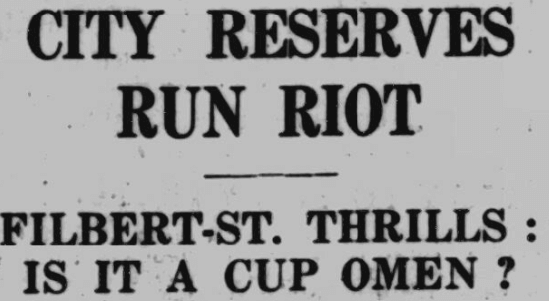
It was an omen. There would be another riot twelve days later.
After watching that performance, manager Peter Hodge decided to restore his veteran centre-forward to the first team. We hadn't yet found a satisfactory replacement, and the following Saturday, for the League game at White Hart Lane, Channy was back at number 9. We came away with a shock 1-0 victory. This is how the news was received in the city centre:
In Leicester on Saturday night there was but one topic of conversation. In the Market Place, a loud cheer was raised by the stallholders as soon as the result was known. News sellers could not conceal their appreciation of the fillip this fine win would give the sports edition sales. Tram conductors, and even inspectors, had to say their little piece about it while passengers were being carried past their destinations because of the fascinating nature of the subject. (From the Leicester Chronicle).
Channy stayed in the team for the next match - the Cup tie at The Den.
January 27th
Millwall were a League below Leicester - in Division Two - but boss Bill McCracken was feeling confident. He told a Leicester Evening Mail reporter that City's 'stylish' football would not stand up to the 'robust stuff' that Millwall use in the Cup. In the reporter's judgement, however, 'McCracken may find that Leicester are not so 'ladylike' as they have been described on so many occasions. The restoration of Chandler to the attack at Spurs has added the necessary punch'.
At Leicester Station on Saturday morning there wasn't enough space on the Football Special, and 'late arrivals joined trains from Nottingham carrying Forest fans to their tie at Stamford Bridge. When that train pulled in there was a lot of good natured banter, followed by mutual expressions of goodwill'.
The players had traveled on an earlier train, and as it passed through north London there was another omen:
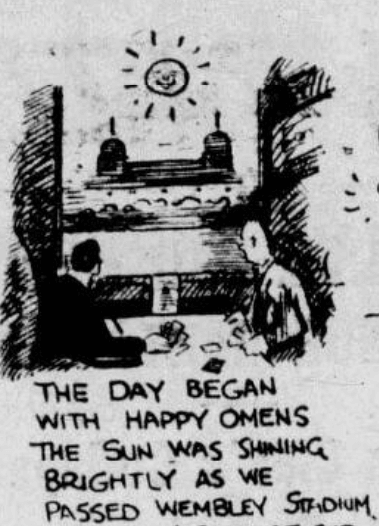
After arriving at Marylebone, they continued 'by motor'. The man from the Leicester Chronicle described the rest of the journey: 'We sped past Marble Arch, crossed the Thames and skirted The Oval to the strains of haunting melodies, as Sandy McLaren (the Leicester keeper) acted as choir leader'.
At The Den, the thing that really struck that reporter was the roar of the Millwall fans. Their shouts of "Come on Lions!" were so loud 'they must have been heard some distance away'. On days like this, noise from outlying grounds would often carry as far as central London, and this was one of those unique occasions that only the early rounds of the FA Cup could provide. With bigger gates, heightened passions, and the luck of the draw giving the big London teams home ties, the skies were filled with noise from all directions - Stamford Bridge (that Chelsea v Forest game), Highbury (Arsenal v Crystal Palace), White Hart Lane (Tottenham v West Ham) and here, south of the river, where the cries of thousands of Leicester fans were added to the mix.
Millwall started the game brightly, but then came the key breakthrough. There's no Pathe news footage of Sep Smith's goal, but it was described so well at the time that we can visualise exactly what happened:
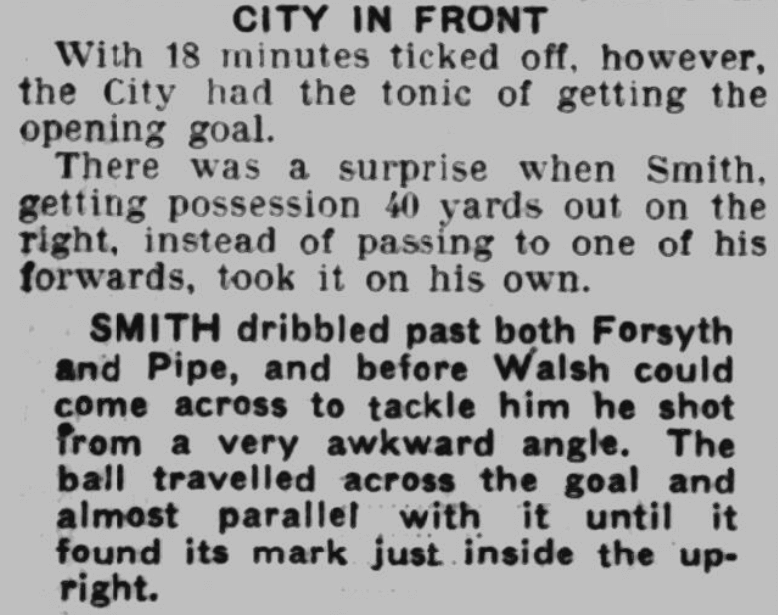
Millwall equalised, but then we went into overdrive. At half-time we were 4-1 up, playing 'cool, methodical, on-the-floor football'. Channy, Arthur Maw from 35 yards, then Danny Liddle were the scorers. Here's Channy's goal:
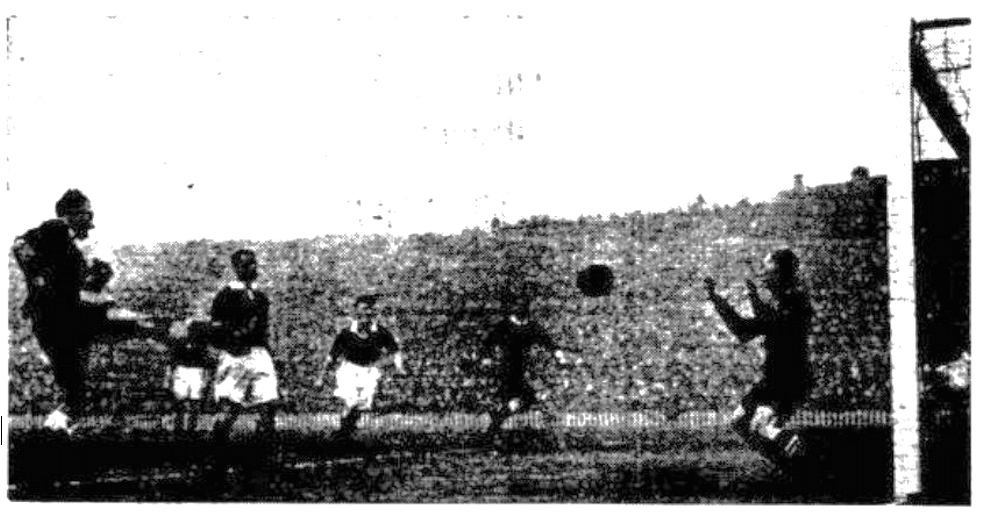
That kit we we're wearing was red shirts with black shorts.
After the break Channy and Arthur Lochhead made it 6-1, before Millwall quickly got two back. It was 6-3 after 63 minutes, which is how it ended. That word was back in the headlines:
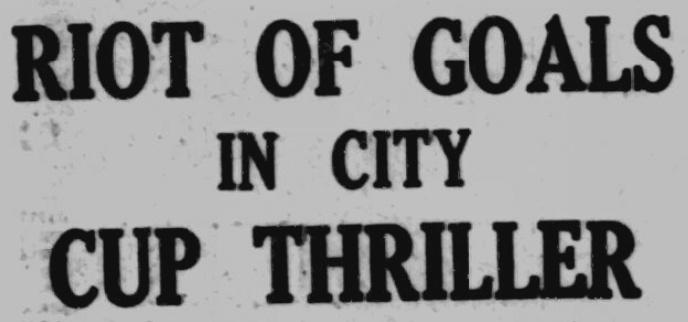
As the team arrived back in Leicester, 1,000 fans were there to greet them, the biggest cheer reserved for Channy.
In the next round we played Birmingham City at St. Andrews. Look at the picture below, taken at the Queen's Hotel in Coventry where the team stopped on the way home, and see if you can guess the outcome of the game:
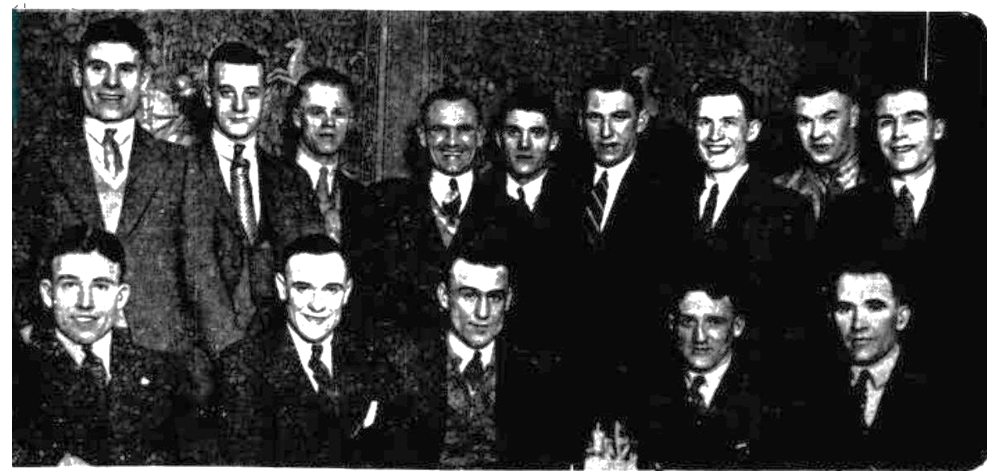
The man with the beaming smile in the middle of the back row is Arthur Chandler, 38 years young, whose goals gave us a 2-1 win and took us into the quarter-finals.
Here's one of his goals:

Next was another tough away tie - at Preston, who had Bill Shankly and Jimmy Milne in their half back line. We came away with another fantastic result. This was the only goal of the game:
'Furnival', the famous cartoonist of the Lancashire Evening Post, saw it like this:
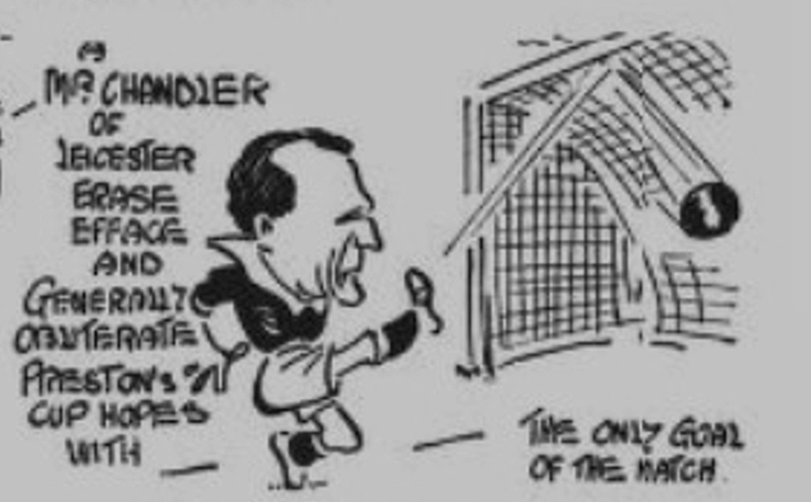
The man who had been written off by everyone was now the talk of the nation, on a sensational scoring streak, wth key goals at The Den, St.Andrews and now Deepdale putting us in sight of our first ever trip to Wembley.
The semi-final draw paired us with Portsmouth, with St. Andrews again the venue.
It was the biggest game in the 50 year history of the club, and there were 12,000 at Leicester Station that morning. 'Not since Armistice Day in 1918 had there been such scenes of jubilaiton' said the Evening Mail, which had some wonderful pictures. This is what Leicester fans looked like back then:
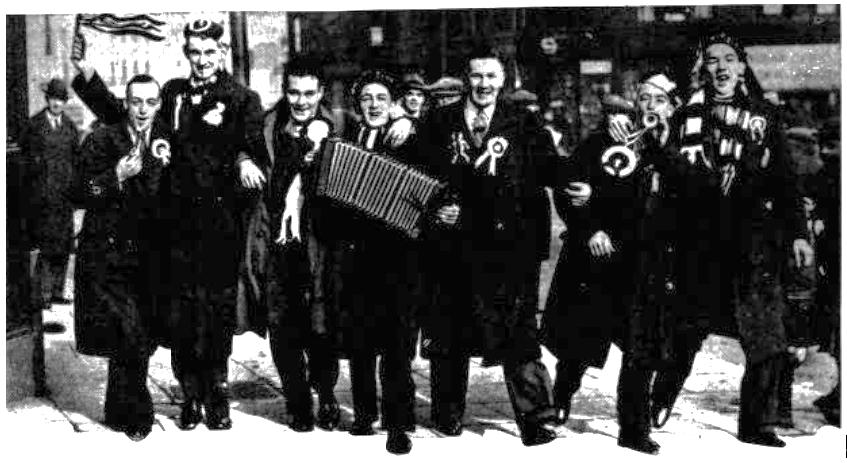
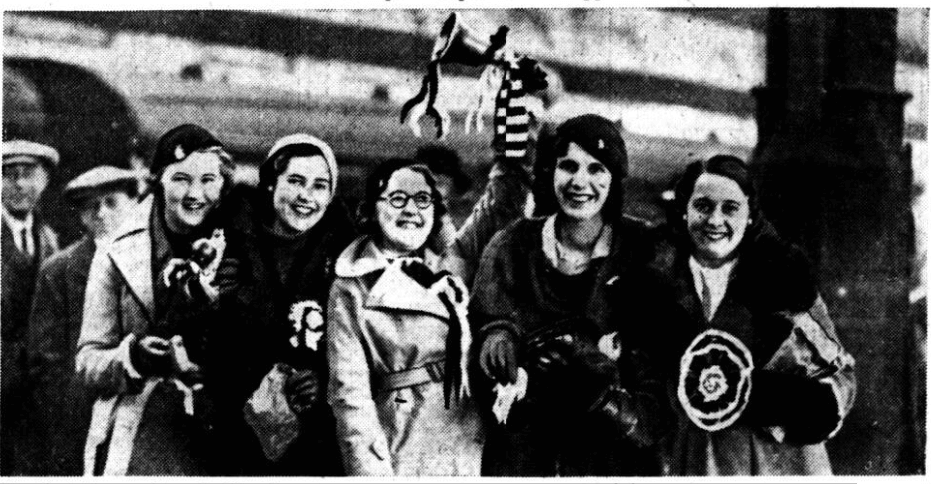
And this was the players' wives on the way to the game, Channy's wife one from the right:
And there was one more woman heading for St. Andrews. With her advancing years, she had been unsure whether she should make the journey. But when she woke up that morning in London she knew she just had to be there. She hurried to Paddington Station and boarded a train for Birmingham. Had she told her son she was coming, she would have been given a comfortable seat alongside those wives in the Main Stand, but she didn't want her impulsive decision to disturb his preparation. She paid her money and stood on the packed terraces.
How much of the action Mrs. Chandler, Arthur's mother, was able to see we don't know, but we can be sure that when he ran out that day, she'd have been the proudest person in the 66,000 crowd.
Here he is in action, white shirt and black shorts, Pompey in red shirts and white shorts.
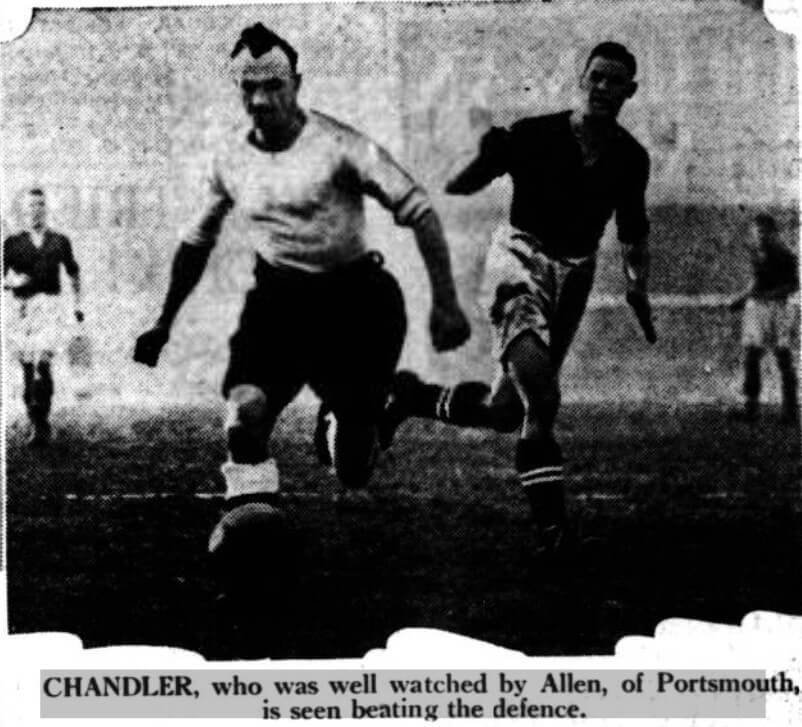
Sadly, we lost 4-1. Channy's glorious swansong would not be ending at Wembley.
But before leaving this story, there's another song we need to mention. Remember those 'haunting melodies' of the players' choir as they passed through London on the way to The Den? On the day of the semi-final, captain Roger Heywood told us more:
There had been too much seriousness in the team. We decided to form a kind of choral society, with Sandy McLaren as leader, and Channy and Hughie Adcock, with his child impersonations, contributing the harmony.
There was one number that they sang at every stage of that Cup run. Not 'Sweet Caroline', but 'Sweet Adeline' - a massive hit in the early decades of the century.
Here are the lyrics:
Sweet Adeline
My Adeline
At night, dear heart
For you I pine
In all my dreams
Your fair face beams
You're the flower of my heart
Sweet Adeline
Here's a comic version from a 1930 cartoon:
It's also been in The Simpsons:
In an alternative history, we went all the way in 1934, and City fans sang the song at Wembley as we lifted the trophy. It was the same when the Cup was paraded through the streets of Leicester, helping to establish it firmly in everyone's minds as the club's very own theme tune, a tradition that has continued to this day.
If only.
Oh well, perhaps the @Union FS lads, who've always had a keen sense of history, could polish their barber-shop harmonies and resurrect it on Saturday.
That's the first part of the story. Part Two coming right up.


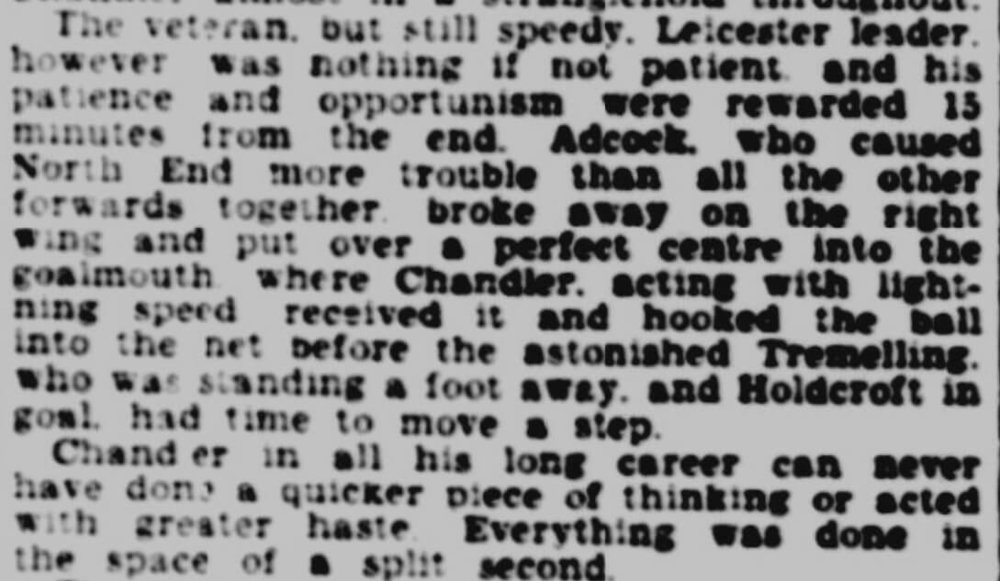
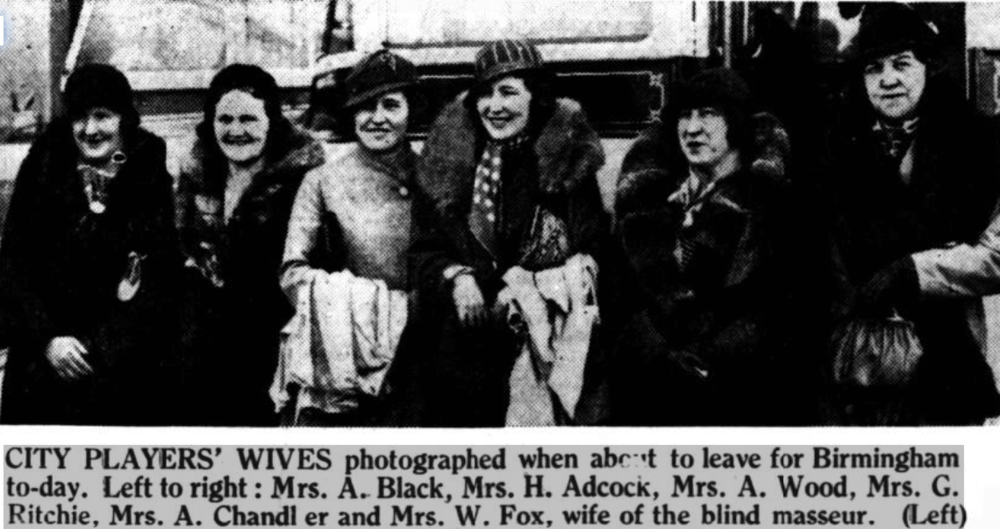
Recommended Comments
Join the conversation
You can post now and register later. If you have an account, sign in now to post with your account.
Note: Your post will require moderator approval before it will be visible.